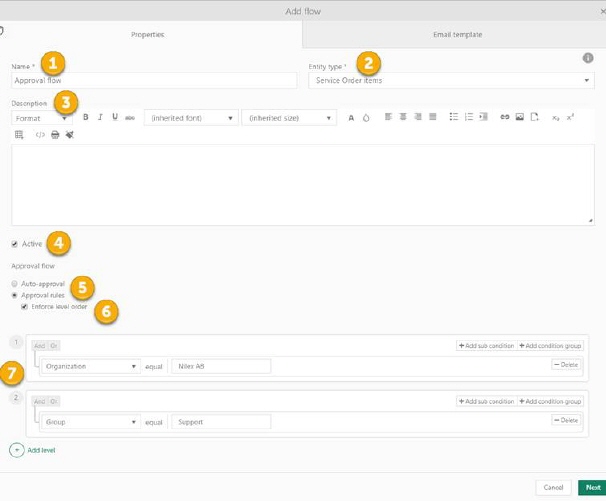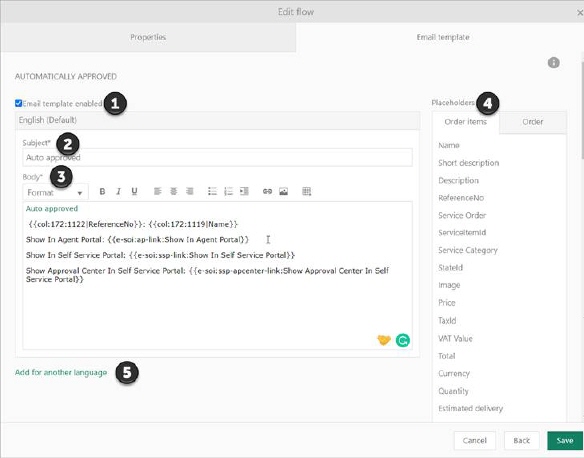First step – Properties
 Approval
flow properties
Approval
flow properties
1.
Name: Approval flow name. Mandatory field.
2.
Entity Type: Choose Entity Type from
dropdown list. (in current version only Service Order
Item is selectable). Mandatory field.
3.
Description: Use text to make it easy for you to find the approval flow
you are looking for in the approval flow
list.
4.
Active: Enable this checkbox if approval flow shall be active.
5.
Approval flow: Choose one of the approval flows types:
•
Auto-approval means that order is automatically approved. If you
choose this one no more definitions is needed, just click Next to go on to second step to configure Email templates.
• Approval
rules means that order should be approved by person/group you defined in
Condition Builder (7).
6.
Enforce approver order: This option is visible only if Approval rules is selected. Enabling this option to
defined that order must be approved in same order as you define in Condition Builder. If not enabled the users defined in
Condition Builder can approve in any order,
independent of each other.
7.
Condition Builder: This option is visible only if Approval rules is selected. Here you defined who will be
in charge to approve/reject order. In the condition builder you can select
specific User, Group, Organization, Requester
Reference or Service Order Reference. Requester
Reference can be chosen among all available person reference field
defined for Requester, e g AD Manager. Service order reference - a reference
to the selected approver from ordering popup can be selected.
The condition is built of a logical hierarchical structure
of Conditions and Sub conditions. The
different conditions are linked by operators And (AND operator)
and Or (OR operator). You can select And to
require match of all the linked conditions, or Or if match any
single condition from the linked conditions defined is enough. The order is
approved only if the result of the complete logic expression is true.
The section is initially displayed with one empty condition
row, Add condition and Add sub
condition buttons, Delete button and operator
selection And/Or.
Second step – Email Templates

Auto approval email
template
In this step you define email templates used when order
is processed.
1.
Email template enabled: Enable this checkbox if you want to
send this email when order is created.
2.
Subject: Enter Subject of the Email message.
3.
Body: This box is used to define the email body text in HTML format. Use
placeholders (4) to add information from current Service
Order Item.
4.
Placeholders: Consists a list of all properties referred to service item
and service order. Double-click the placeholder to include it in the template
along with other text. These tags will be replaced with the actual entity value
when the order is sent to the user.
Placeholders
are dividing in two groups: Order items and Order.
Order
items list contains properties related to order item and following groups of
buttons:
• Always
available buttons
o Show
In Agent Portal Button – This button will open order in Agent portal
o Show
In Self Service Portal Button – This button will open order in Self Service
portal
o
Approve Service Item Button – This button will approve order
item
o Reject
Service Item Button – This button will reject order item
o Show
Approval Center In Self Service Portal Button – This button will open
Approval Centar in SSP
• Buttons
available only if Approve single order is enabled in Global function
settings
o
List Order Items With Same Flow - This will show all order items
with same approval flow in the order
o
Approve Service Items With Same Flow Button -
This button will approve all items from the list above at the same
time
o Reject
Service Items With Same Flow Button - This button will reject all items from
the list above at the same time
• Buttons
available only if Depended items are enabled in Global function
settings
o List
order dependent items - This will show all depended order items with same
parent
o
Approve dependent items button - This button will approve all
depended items from the list above at the same time
o Reject
dependent items button - This button will reject all depended items from the
list above
Order list contains properties related to order such as Order Date,
Requester, Customer account etc. Order list also contains all properties defined
in order info section such as faciliate properties. Order list also contains two
buttons:
o Show
In Agent Portal Button – This button will open order in Agent portal
o Show
In Self Service Portal Button – This button will open order in Self Service
portal
5.
Add language definition: Select the language from the list
to create template for the specific language. Define Subject and Body for the selected language in respective
textbox. Repeat the procedure for every language needed. User will receive the
notification in chosen user default language.
If you select
Approval rules in the first step, Email
Template step will be divided in four tabs, to configure templates for
email notifications sent to/when:
• WAITING FOR
APPROVEMENT
• REQUEST
APPROVED
• REQUEST
REJECTED
• NEW REQUEST FOR
APPROVAL
 Approval
flow properties
Approval
flow properties